Remembering conductor Andrew Davis (1944-2024) | reviews, news & interviews
Remembering conductor Andrew Davis (1944-2024)
Remembering conductor Andrew Davis (1944-2024)
Fellow conductors, singers, instrumentalists and administrators recall a true Mensch
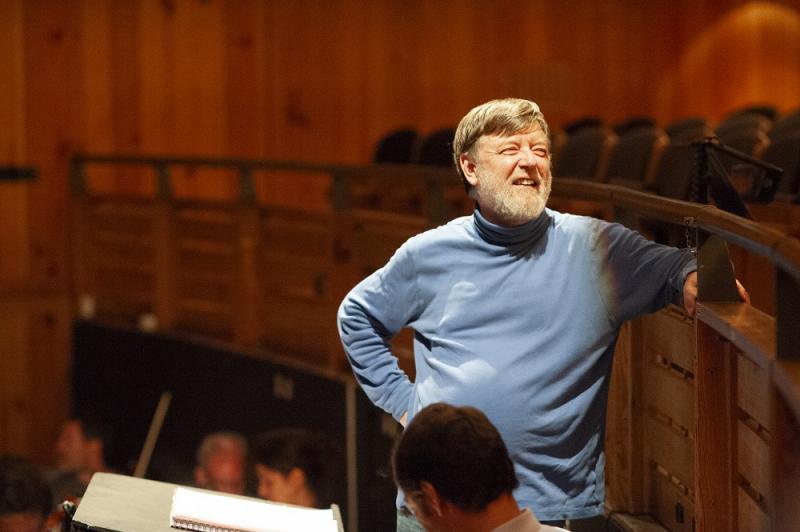
As a human being of immense warmth, humour and erudition, Andrew Davis made it all too easy to forget what towering, incandescent performances he inspired. Now is a good time to recall those properly to mind, to listen to his huge discography, and to assess his proper place among the top conductors – again, as one of such versatility and range that, to adapt what Danny Meyer writes below, he might have been labelled a jack of all trades when he was a master of all.
The range of tributes here reminds me both what an extraordinarily fine interpreter of operas he was – respected at Glyndebourne as “thoroughly decent” to all (the verdict of my partner and others who sang in the chorus during his tenure), yet supreme and vivid in everything from Tchaikovsky to Berg, Britten and Birtwistle – and what a gamut of the orchestral repertoire he ran in the concert hall, especially with the BBC and Toronto Symphony Orchestras, carving out a special place in the ongoing interpretation of British music. As for high jinks at the Last Night of the Proms, which Edward Gardner cites as a possible reason for why a few closed minds didn't take him more seriously, surely this performance of Grainger's Tribute to Foster is serious fun (and the elegy at its heart touches a special chord now).
Our two orchestral musicians recall what a sensitive partner he was in concertos, as mediator between soloist and orchestra; I experienced that three times, twice in Bartók and later in the Elgar Violin Concerto, a notoriously difficult work to get to the heart of, with James Ehnes and the Philharmonia (fortunately there’s also a recording). The humorous anecdotes and the spirit of fun I’ll leave to our contributors, adding only add that I felt a singular sense of loss one doesn’t always have when hearing news of a great one’s passing. David Nice
Brian Dickie, opera company director
Andrew’s career at Glyndebourne spanned 40 years, and he conducted no less than 30 different operas there. His first was Capriccio in August 1973 and his last 40 years later – Billy Budd on August 27 2013 at the Proms after a memorable run of performances that August at Glyndebourne. It is a remarkable record unlikely ever to be surpassed.
He joined the music staff at Glyndebourne that summer of 1973 to be assistant to John Pritchard on John Cox’s new production of Strauss's Capriccio. It was a magical start to the young man’s operatic career – a cast including Elisabeth Söderström, Richard Stilwell, Håkon Hagegård and Hugues Cuénod – with youngsters John Tomlinson and Anthony Rolfe Johnson amongst the Lackeys. [Pictured below by Guy Gravett / Glyndebourne Productions Ltd. © Glyndebourne Productions Ltd: In rehearsal for Rusalka at Glyndebourne, 2011].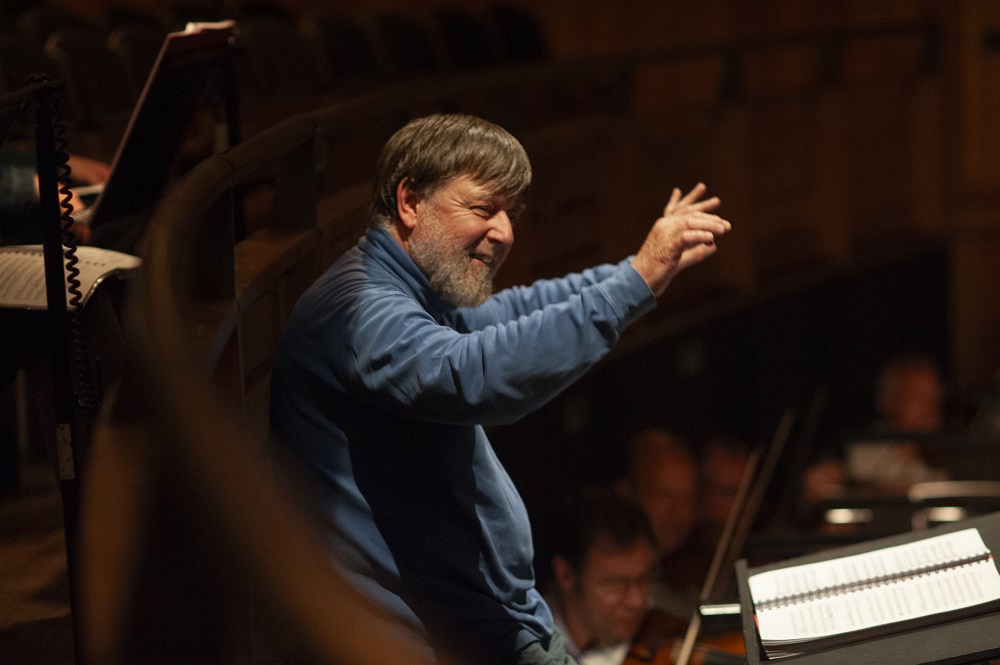 John Pritchard was an ideal mentor to this supremely gifted young conductor, so Andrew was ideally prepared for his operatic debut. He took over three performances of Capriccio from JP who was also conducting Le nozze di Figaro and von Einem’s The Visit of the Old Lady during July and August that year.
John Pritchard was an ideal mentor to this supremely gifted young conductor, so Andrew was ideally prepared for his operatic debut. He took over three performances of Capriccio from JP who was also conducting Le nozze di Figaro and von Einem’s The Visit of the Old Lady during July and August that year.
And so began his happy Glyndebourne journey, the first 15 years of which I witnessed first hand. When Bernard Haitink gave up his 10-year tenure as Music Director in 1988 Andrew was the obvious choice to succeed him. He arrived from Toronto, and I departed for Toronto! And of course I saw a great deal of him there since he retained a connection with the Toronto Symphony during his Glyndebourne years.
Andrew was the happiest of men, a lovable and entertaining companion, and a musician and man of the theatre of rare distinction. He wore his seriousness lightly but none of us had any doubt about his deep passion and musical perceptiveness.  I saw much of him and Gianna Rolandi, the soprano who became his wife, in Chicago during my 13 years there – and it is amusing to recall that during the summer of 1988 Nancy [Gustafson, great soprano and Dickie’s wife at the time] and I went as chaperones on their first date to the movies. This was to The Last Emperor in Eastbourne. Gianna was at Glyndebourne singing Konstanze, and Andrew conducting Kát’a Kabanová [pictured above by Mike Hoban / Glyndebourne Productions Ltd. © Glyndebourne Productions Ltd.: Davis in Kat'a rehearsal with director Nikolaus Lehnhoff, 1988]. Happy days – we will miss him so much.
I saw much of him and Gianna Rolandi, the soprano who became his wife, in Chicago during my 13 years there – and it is amusing to recall that during the summer of 1988 Nancy [Gustafson, great soprano and Dickie’s wife at the time] and I went as chaperones on their first date to the movies. This was to The Last Emperor in Eastbourne. Gianna was at Glyndebourne singing Konstanze, and Andrew conducting Kát’a Kabanová [pictured above by Mike Hoban / Glyndebourne Productions Ltd. © Glyndebourne Productions Ltd.: Davis in Kat'a rehearsal with director Nikolaus Lehnhoff, 1988]. Happy days – we will miss him so much.
Anne Evans, soprano
Just occasionally one finds oneself drawn into a musical experience that is so overwhelming that it cannot be described in words. This was what I felt about Andrew's profound conducting of the Tristan Prelude and Liebestod at the Proms. He was a great musician and a lovely person.
Loie Fallis, orchestra manager
Fresh out of University, I was hired as an arts administrator by the then general manager of the Toronto Symphony Orchestra Walter Homburger; the great impresario who counted among his young discoveries Glenn Gould, Louis Lortie and James Ehnes. The TSO music director at the time was Andrew Davis; he was wonderfully kind, witty and charismatic and I am proud to have known him as a friend and to have worked with him for 45 years.
 Andrew, besides seemingly having the entire symphonic canon in his head, would delight in finding the perfect companion pieces to make every programme just right if not occasionally quirky. Grainger, Ives, Hindemith, Berg and Tippett became familiar names to Torontonians. In the case of Sir Michael, he was also a familiar face. He'd travelled to Toronto for Canadian premieres of The Rose Lake and The Mask of Time. And, there were world premieres too. Andrew commissioned works from Canadians R. Murray Schafer, Alexina Louie and Glenn Buhr, to name a few.
Andrew, besides seemingly having the entire symphonic canon in his head, would delight in finding the perfect companion pieces to make every programme just right if not occasionally quirky. Grainger, Ives, Hindemith, Berg and Tippett became familiar names to Torontonians. In the case of Sir Michael, he was also a familiar face. He'd travelled to Toronto for Canadian premieres of The Rose Lake and The Mask of Time. And, there were world premieres too. Andrew commissioned works from Canadians R. Murray Schafer, Alexina Louie and Glenn Buhr, to name a few.
Naturally, opera played a part in Andrew's TSO programming – most memorably Strauss' Daphne with Catherine Malfitano, which we took to Carnegie Hall, and Massenet's Thais, which would be Sir Andrew's last TSO recording, featuring Canadians Joshua Hopkins and the late Erin Wall. Also with Erin, the TSO would perform and record Sir Andrew's own big orchestration of Handel's Messiah – which was billed as "Toronto's mega-Messiah – now with marimba!". Andrew loved that poster! Mahler's Eighth Symphony would receive its Canadian premiere under Andrew's baton (he was still using a baton then) and a double bill of Stravinsky's L'histoire du Soldat, with prima ballerina Karen Kain, and Oedipus Rex with speaker John Neville, would tour to the Edinburgh Festival in 1986.
 Andrew led two historically significant tours (1978) to China – the TSO was the first Canadian orchestra to be invited to enter the country after the Cultural Revolution; with Canadian contralto Maureen Forrester and 19-year-old pianist Louis Lortie. And in 1987, with the Canadian Odyssey Tour the TSO was the first symphony orchestra to perform in Inuvik, North West Territories (north of the Arctic Circle). This unique tour seemed to pique Andrew’s curiosity, his love of nature and places he'd never been – performing with and for a new audience. [Pictured above, Davis and Bessie Wolki in Inuvik].
Andrew led two historically significant tours (1978) to China – the TSO was the first Canadian orchestra to be invited to enter the country after the Cultural Revolution; with Canadian contralto Maureen Forrester and 19-year-old pianist Louis Lortie. And in 1987, with the Canadian Odyssey Tour the TSO was the first symphony orchestra to perform in Inuvik, North West Territories (north of the Arctic Circle). This unique tour seemed to pique Andrew’s curiosity, his love of nature and places he'd never been – performing with and for a new audience. [Pictured above, Davis and Bessie Wolki in Inuvik].
 Andrew felt it important to connect with all the various audiences at the TSO. So he might be found sometimes at the organ playing and conducting Saint-Saëns' Third Symphony, or appearing on our Children's Series at the keyboard, narrating and conducting the same composer's Carnival of the Animals [pictured left as lion] or conducting and singing the Major General's Song from Gilbert and Sullivan's The Pirates of Penzance [pictured below]. A little known secret: Andrew hid the verses in the pith helmet in case he needed to sneak a peek at the words.
Andrew felt it important to connect with all the various audiences at the TSO. So he might be found sometimes at the organ playing and conducting Saint-Saëns' Third Symphony, or appearing on our Children's Series at the keyboard, narrating and conducting the same composer's Carnival of the Animals [pictured left as lion] or conducting and singing the Major General's Song from Gilbert and Sullivan's The Pirates of Penzance [pictured below]. A little known secret: Andrew hid the verses in the pith helmet in case he needed to sneak a peek at the words.
Andrew had a 50-year connection with our city. He made Toronto his home while Music Director (1975 to 1988), and then, as Conductor Laureate, he returned annually. Toronto loved Sir Andrew and he was tickled when the City of Toronto named Sir Andrew Davis Lane in his old neighbourhood to show their gratitude [pictured top left, Davis there with Loie Fallis].  The last TSO concert that Sir Andrew conducted was in November 2023. The programme featured his son Ed Frazier Davis as composer of Mother and Child, written in memory of his mother, soprano Gianna Rolandi. Edward also sang as baritone soloist in the Faure Requiem. Between these two moving works, the poignant Mozart Fortieth Symphony was played. In retrospect, it was a powerful final memory of Sir Andrew for Toronto audiences and our musicians. Thank you, Sir Andrew – to quote the “Pie Jesu” from Fauré’s Requiem, "may you find eternal rest".
The last TSO concert that Sir Andrew conducted was in November 2023. The programme featured his son Ed Frazier Davis as composer of Mother and Child, written in memory of his mother, soprano Gianna Rolandi. Edward also sang as baritone soloist in the Faure Requiem. Between these two moving works, the poignant Mozart Fortieth Symphony was played. In retrospect, it was a powerful final memory of Sir Andrew for Toronto audiences and our musicians. Thank you, Sir Andrew – to quote the “Pie Jesu” from Fauré’s Requiem, "may you find eternal rest".
Edward Gardner, conductor
I grew up with Andrew Davis’s music-making. Many of the iconic choral works at the Proms were my first chances to hear those pieces, and he gave my first experience of Messiaen’s Turangalîla-Symphonie, Tippett, Birtwistle, to name only a few. The breadth of his expertise was breathtaking.
As I write this I’m watching the wonderful films of Walton’s Belshazzar’s Feast from Leeds Town Hall [watch below], and Vaughan Williams’s Fantasia on a theme of Thomas Tallis, both performances my first exposure to these works.
My university choir was once conducted by him. I have no recollection of what we sang, but I remember him conducting a searing performance of Britten’s Four Sea Interludes. He was such an educator for me, and so many others, from afar.
I met Andrew for the first time in the tea queue in a break from a rehearsal of Berlioz’s Symphonie Fantastique with the BBC Symphony Orchestra; he looked addled from the hard work, but he had the time and generosity for a quick chat.
There was a story I heard when I was a student about Andrew and the BBC Symphony Orchestra. He’d just rehearsed a section in detail, and was flicking back through the score. "I don’t know where to go back to,” he said. “Cambridge,” suggested one of the trombone players.
It was not until much later, when Andrew was Music Director of Chicago Lyric Opera, that I got to know him well. The man I found wasn’t anything like the self-assured, easy-authority figure of the Cambridge cliché. I found him gentle, generous, giggly, supremely knowledgeable (with anecdotes on hand to support), and a lot of fun.
I’ll always remember the dinners we shared at his favourite restaurant, accompanied by negronis, courses punctuated by naughty cigarettes outside in the cold. He talked for hours about his musical loves, his relationship with Tippett, alongside the myriad composers he worked with and knew. I learnt so much, and he was overjoyed to share his world with me, or anyone who could share his enthusiasm.
I wonder now why he wasn’t considered to be in the very top echelons of conductors, at least in his lifetime. I’m sure that his regular presence at the Last Night of the Proms didn’t help with the snobs (of course he wouldn’t have cared at all, he found it fun). I also think the sheer breadth of his work was mistrusted by some. In these last years he had conducted, as well as much more, his own arrangement of Handel’s Messiah, Stokowski’s arrangements of Bach, alongside Tippett and Vaughan Williams and a Ring cycle. He loved music, so much music, and would happily travel the world to conduct it all. For me this breadth reflects his enormous gift and intellect.
We exchanged emails during Covid, when Andrew revealed he was translating Homer’s Iliad to keep his brain busy: this wasn’t an ordinary mortal.
But no one should be fooled by his joyous, light exterior. He was a man of a fundamental passion, who cared deeply about music and musicians. Chandos released a short video of Andrew listening to a recording take of Vaughan Williams’s Ninth Symphony. It shows his feeling and care, in what he would have thought of as a private moment; almost an intrusion. I find it incredibly moving.
Our initial emotion now is of a huge loss in our musical firmament, but we have an opportunity to reflect on Andrew’s extraordinary legacy which I’ve no doubt will live on and grow. I’ll also miss his chuckle recounting how silly Michael Tippett, or anyone else for that matter, was in conversation.
Caroline Harrison, viola player
I joined the BBC Symphony Orchestra in 1990. I was on trial for Co- Principal viola and we were recording Britten’s Passacaglia from Peter Grimes and Vaughan Williams’s Fantasia on a Theme of Thomas Tallis for the Teldec British line recordings. At the end of the last day he announced I had got the job.
Throughout the next 30 years plus it was always a joy to work with him not only when he was Principal Conductor but also when he became Conductor Laureate of the orchestra. So many magnificent Proms concerts over the years where he was loved by the Promenaders.
Sir Andrew was always encouraging to play for and make you feel at ease. He wanted to get the best from you and seemed to understand how to achieve it. He had a sublime affinity with British music and I have many happy memories of Elgar, Vaughan Williams [watch below a Gloucester Cathedral performance of the Tallis Fantasia] and Tippett.
He was also a master of accompanying soloists. He instinctively knew how to follow and create a perfect balance between soloist and orchestra. He had a great wit and loved regaling various humorous events from rehearsals and concerts he had done. He had certain phrases when we didn’t get it quite, such as “close but no cigar” followed by a quick laugh. There was also the “no, no, no, no” when we hadn’t understood something correctly.
When on tour we would always do two encores. Something by Delius was a great favourite for him but this usually followed by “The Wild Bears” from Elgar’s Wand of Youth Suite No. 2. He would race back onto the stage with a big grin on his face even if the applause was dying away just to ensure we got to play it.
Andrew was synonymous with the Proms and I feel very privileged that I was invited by the BBC Philharmonic to play in what would be his last Prom. His perfect programme was of Tippett’s Fourth Symphony followed by Vaughan Williams’s Ninth. It was after Covid had hit the world and certainly the first concert I had done with him since. We had a few fantastic days in Manchester rehearsing and he was delighted by the way the orchestra was playing the music. Although he was showing some signs of fragility there was no evidence of those on the podium that evening. It was a very inspiring concert full of energy and fabulous music perfectly realised and one that I shall remember for years [Davis pictured below by Chris Christodoulou during the performance]..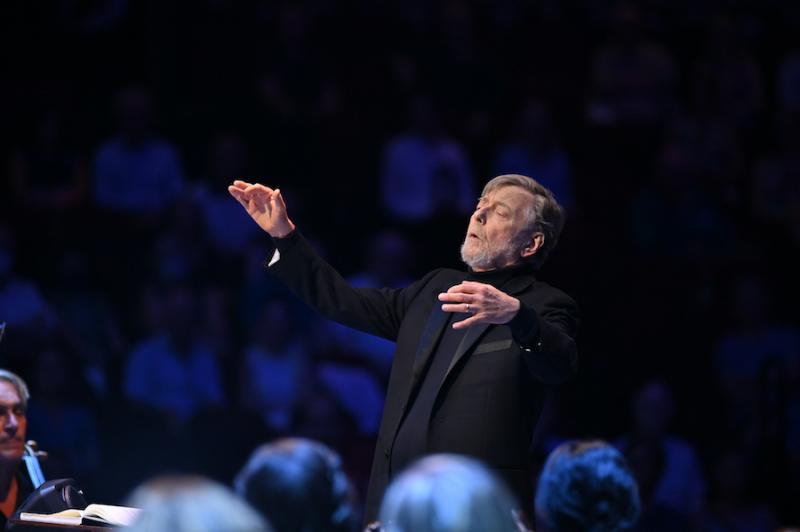 My life as an orchestral musician began with Sir Andrew and spanned so much of the rest. I shall miss him and the music he loved.
My life as an orchestral musician began with Sir Andrew and spanned so much of the rest. I shall miss him and the music he loved.
Ron Howell, choreographer
My first professional encounter with Andrew was at Glyndebourne in 1992, where we did Tchaikovsky’s The Queen of Spades, and again in 1994 with Eugene Onegin. Both productions turned out to be astonishing successes, not least because of Andrew’s music making.
Of course we had met on several occasions. My partner was Graham Vick who was Director of Productions at Glyndebourne when Andrew was its Music Director. We covered many shows together over a 10 year period .
My recollections of Andrew are fairly consistent with all the other tributes that have been paid. He was a man of great ease, poise, natural charm and great humour. Very down to earth and 100% fair, democratic even, in his personal and professional approach to the individual and or the group.
As the young choreographer I was then, I found he treated me with great kindness and respect. I never had to worry or question his choice of tempi , nor was I afraid to approach him, which never happened ...it wasn’t necessary. Andrew had an innate feeling for what the music was, and great instinct which enabled him to feel the dance. [Watch the complete Glyndebourne Queen of Spades over on YouTube and scenes from Eugene Onegin below],
Music and choreography, under his baton , were seamless. It all flowed naturally, organically, it lifted your spirit. In short …it danced! Andrew was not a conductor who interfered .On the contrary he followed the direction, enhanced and complemented it. He made it better. One never felt this is Davis’s take on Rossini, Berg, Mozart or Tchaikovsky. One always felt one had heard the composer’s voice, being the perfect conduit as he selflessly allowed the master’s voice to pass through his mortal body. He never embellished nor imposed on a score …he did it simply. And, as we all too well know , simple is the hardest thing to master.
He will be a great loss to the classical music world and an even bigger one to the operatic community. As I write this, I feel so privileged proud and blessed that our paths crossed and that we created, en route , some marvellous stuff. Thank you, Andrew, thank you.
Vladimir Jurowski, conductor
Sir Andrew Davis was my predecessor at Glyndebourne and one of the longest serving music directors of this venerable British institution – he worked there for twelve summer seasons between 1988 and 2000 (many years later when we both found ourselves sitting in Glyndebourne’s courtyard cafeteria one summer afternoon in 2017, he told me jokingly: "You know, my dear, I am really cross with you, because you’ve outstayed me at Glyndebourne by one year!..")
My first impressions of Glyndebourne in those TV broadcasts of the 1990s were all with him at the podium! I remember Tchaikovsky’s Eugene Onegin and The Queen of Spades (both in the splendid productions by Graham Vick), Rossini’s Ermione, Berg’s Lulu and many others, all conducted with unwavering passion and excitement! Later, during my tenure at Glyndebourne, Sir Andrew returned twice – to conduct the revival of Dvorak’s Rusalka and a new production of Britten’s Billy Budd. I remember talking to him at length about this amazing Britten score; he made me fall in love with a work I’d been finding hard to access up to that point.
Sir Andrew was a born communicator, who had no difficulties convincing other people about the greatness and beauty of literally any score he conducted. I think it is through him that I first understood certain pieces by Elgar and Vaughan Williams. I’ll never forget the video introduction to Berg’s Lulu he made in his later years at Chicago Lyric Opera, sitting at the piano and playing Berg’s music from memory [watch below].
Because of his activities in America we didn’t see enough of him in Europe for many years. It is one of my little prides as a chief-conductor of the Berlin Radio Symphony Orchestra that very recently I managed to invite Sir Andrew to make his debut with them – it was only last season – and he made Berlin musicians and its audience fall in love with Vaughan Williams’ Fifth Symphony, which they had probably never heard before. He was due to return to conduct them next year…
A man of great talents who has served the music with total dedication and selfless devotion, he will be sorely missed… RIP Sir Andrew.
Felicity Lott, soprano
So many happy and moving memories of working with Andrew at Glyndebourne, in Chicago and at the Proms. I can’t remember him ever losing his temper; he was always smiling and enjoying making music. As everyone has been saying, it was always about the music and not about himself. I loved watching him conducting the Prelude and Liebestod from Wagner’s Tristan und Isolde with Anne Evans at the Proms [watch above] and thought it was a very fitting tribute to Andrew.
Daniel Meyer, violinist
I think Andrew was perceived as a "jack of all trades," and the problem with this epithet is the other half of it, "master of none."
Andrew really was a master of so many things – I enjoyed recording and performing so much English music with him – Elgar, Vaughan Williams and Tippett in particular. My first recording with him was Tippett's The Mask of Time and my last A Child of our Time, soon to be released. [Pictured below by Chris Christodoulou, Davis conducting the BBC Symphony Orchestra at his most intense]. 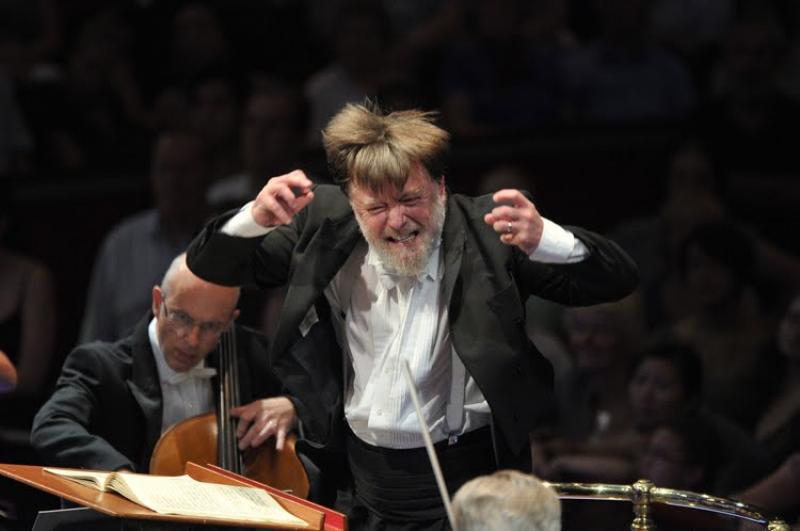
Possible his greatest attribute was his talent in accompanying soloists, both vocal and instrumental. This was not a question of following them, he was simply with them, anticipating what they were going to do. This is really not easy to pull off and requires the conductor to be comfortable with a subservient role. There are few who manage this.
Then there was his way of tackling the most impenetrable of contemporary compositions and making something of them and always with good humour.
We shared our humour. When he left the BBCSO the orchestra gave him a reproduction of a chair by Charles Rennie-Mackintosh. I spent the night before his leaving party with a plastic raincoat, rubber-solution glue and packets of indigestion tablets so that I was able to present him with a genuinely unique Rennie Mackintosh. He later professed that it was his favourite leaving present but he had to dump it at the airport as the tablets kept falling off. I never envisaged he would actually wear it!
Sarah Playfair, opera casting consultant
Of course I had heard and enjoyed Andrew Davis’s performances in concert and opera for many years before I had the privilege of working with him for much of his tenure as Glyndebourne’s Music Director. The range of his musical passion was very wide – during my time at Glyndebourne he conducted operas by Janáček, Tippett, Mozart, Tchaikovsky, Berlioz, Strauss, Stravinsky, Rossini and Berg.[Watch below: Davis discusses his return to Glyndebourne to conduct Britten's Billy Budd].
Andrew was the nicest possible music director – he knew exactly what he wanted to achieve artistically, but in my experience he always achieved that through encouragement, never by bullying or divo behaviour. He was hugely loved by his regular opera companies and orchestras and by the staff and musicians (including singers!) who worked with him. He was also enormous fun – and the many conversations and discussions that I remember with him were always punctuated by that huge laugh.
The last time I saw him was in May 2023, after his performance of A Child of Our Time at the Barbican with the BBCSO. We sat and chatted in his dressing room and agreed to meet up at greater length next time he was in London – I was very conscious of the other friends/fans waiting outside, but he kept asking me to stay a bit longer until I said that he really must see them and we parted. Now I know that it was for the last time. But we exchanged emails only a couple of months ago around the time of his 80th birthday, which he had enjoyed very much, and once again said we would meet up again soon….. but my latest email, only a week before he died (in which I talked about the Birmingham Opera Company’s plans for Tippett’s New Year, which I knew would interest him) remained unanswered. [Pictured below by Paul Grist at BBC Maida Vale Studios, 1997: Aidan Lang (Glyndebourne Touring Opera Director of Productions, Louis Langrée (GTO Music Director), Davis, Ivor Bolton (GTO Music Director), Graham Vick (Glyndebourne Festival Opera Director of Productions)] . 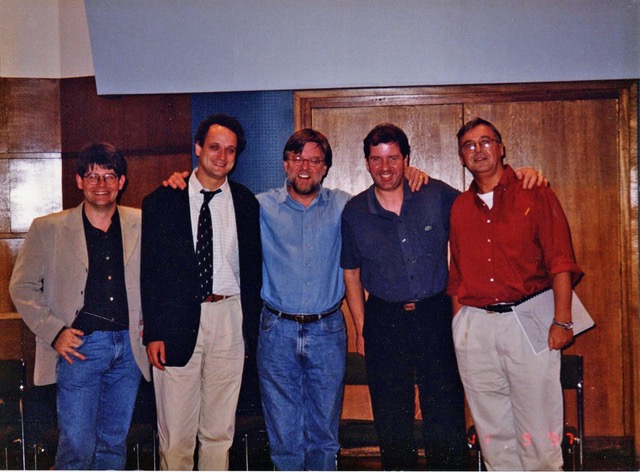 I am very fortunate to have known Andrew and Gianna – we had a lot of fun and excitement as well as riding plenty of crises along the way – memories of them both at Glyndebourne and also of visiting them later on in Chicago are very special
I am very fortunate to have known Andrew and Gianna – we had a lot of fun and excitement as well as riding plenty of crises along the way – memories of them both at Glyndebourne and also of visiting them later on in Chicago are very special
Peter Rose, bass
I am pretty sure that I have performed more with Sir Andrew Davis than with any other conductor, with the possible exception of Simone Young. I did a lot with him at Glyndebourne and in Chicago, as well as Capriccio (La Roche) at the Met, in Chicago, and at the Royal Opera [watch below: Davis on Strauss's last opera], and was due to sing it with him in Edinburgh in August. I also did several concerts with him in London, Edinburgh, and Munich.
I don't think that in over 30 years we ever exchanged a cross word. He was always a delight and with a wicked twinkle, which I always found appealing. I was astonished some years ago to find out that he had never worked in Vienna. I was about to fly there for something and asked him about it. He really didn't seem to mind. He was one of those conductors who was very happy with his lot.
I shall miss him and his warmth and humour. To paraphrase and select from theatre director La Roche's self-styled epitaph, "Rest in peace Sir Andrew the unforgettable, the friend to the cheerful muse, the supporter of serious art".
Share this article
The future of Arts Journalism
You can stop theartsdesk.com closing!
We urgently need financing to survive. Our fundraising drive has thus far raised £49,000 but we need to reach £100,000 or we will be forced to close. Please contribute here: https://gofund.me/c3f6033d
And if you can forward this information to anyone who might assist, we’d be grateful.

Subscribe to theartsdesk.com
Thank you for continuing to read our work on theartsdesk.com. For unlimited access to every article in its entirety, including our archive of more than 15,000 pieces, we're asking for £5 per month or £40 per year. We feel it's a very good deal, and hope you do too.
To take a subscription now simply click here.
And if you're looking for that extra gift for a friend or family member, why not treat them to a theartsdesk.com gift subscription?

Add comment